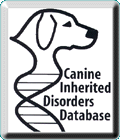
Acral lick dermatitis (lick granuloma)
This is a complex disorder in which dogs lick continuously at an area on their leg , which becomes raw, weeping, and ulcerated. The cause is unknown but inheritance may play a role, since certain breeds are affected more commonly. Boredom or frustration are considered contributing factors. Other possibilities include a disorder of the sensory nerves, or an obsessive-compulsive disorder.
No mode of inheritance has been established.
Owners are generally amazed by the amount of damage a dog can do to his/her limb simply by continuous licking. Frequently the affected area becomes secondarily infected (pyoderma).
Boredom and frustration are thought to play a role in this condition, which is often seen in highly intelligent dogs who spend much of their day alone.
It is important to rule out any underlying cause of the condition. Your veterinarian will likely do a skin biopsy for this purpose. This is a simple procedure, done with local anesthetic, in which your veterinarian removes a small sample of your dog's skin for examination by a veterinary pathologist.
Lick granulomas can be difficult for veterinarians to treat, and frustrating for the owner. Because boredom and frustration are thought to play a role in this condition, your veterinarian will likely discuss with you environmental enrichment and behaviour modification for your dog. S/he may prescribe certain drugs with anti-depressant or anti-anxiety properties for short periods, relying on your help in assessing the effects. Topical corticosteroids may help as well.
As the area is frequently secondarily affected, anti-bacterial therapy may be necessary.
Rule-outs include neoplasia, pressure point granulomas,various infectious agents, underlying sensitivities, allergies, histiocytomas, mastocytomas.
Because inheritance appears to play a role in this complex condition, it is preferable not to breed dogs in whom acral lick dermatitis is a problem.
FOR MORE INFORMATION ABOUT THIS DISORDER, PLEASE SEE YOUR VETERINARIAN.
- (Disorder) related terms:
- Disorder Type:

